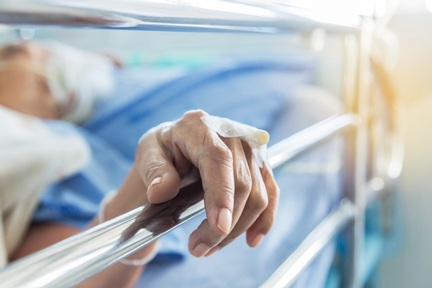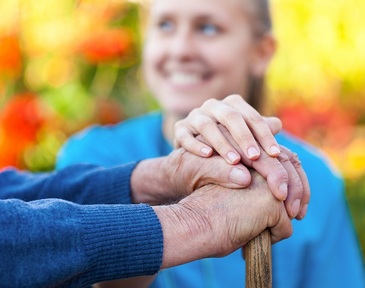'Perfect storm' say care homes told to accept people with coronavirus
Care home owners have reacted with shock and anger to the government’s latest guidance telling them to accept people with COVID-19 from hospital while denying residents entering care homes a test.

Social distancing raises 'legal issues'
Care leaders representing care homes, have viewed such guidance on top of ongoing PPE (personal protective equipment) shortages as "a perfect storm" .
They have ridiculed government instructions advising them to practice ‘stringent’ social distancing ‘for everyone in the care home’.
The 'social distancing' guidance raises legal issues and care staff say it can cause additional distress to residents including those who cannot walk, talk or have conditions such as dementia.
Vic Rayner, executive director of the National Care Forum, representing care homes, told carehome.co.uk: "Care providers are doing their best to isolate residents with symptoms and shield those who are vulnerable.
"However, it is difficult to enforce strict social distancing in a setting that is effectively someone’s home, without isolating everyone which raises legal issues".
The government guidance, published late on 2 April, tells care providers that they should accept COVID-19 patients discharged from hospital. It stated: 'all of these patients can be safely cared for in a care home, if this guidance is followed'.
Unprotected staff in contact with COVID-19 must work
However, fears for the safety of care workers and residents have grown with the latest instruction that 'care home staff who come into contact with a COVID-19 patient while not wearing PPE can remain at work’.
It says, this is because ‘in most instances this will be a short-lived exposure, unlike exposure in a household setting that is ongoing'.

"This offers very little comfort for those trying to manage the personal care and if need be, isolation of residents with COVID 19" says Vic Rayner.
"Exposure in care homes will not necessarily be ‘short-lived’. This is a very unhelpful assumption. The droplet risk to care home staff is just as high as it is for ward staff, community workers and other frontline members of the NHS.
"Care providers are being put under huge pressure to accept people from hospitals without the right information and the right PPE".
No PPE stock, damaged or wrong
The government said 'No wholesaler has been asked to prioritise NHS provision over the care sector, nor should they be doing so'.
However, Vic Rayner says: "They may not have been asked to, but many of our members report that their suppliers are telling them all their supplies have been requisitioned by the NHS Supply chain".
The guidance provides social care suppliers and a supply helpline but she says "some of these alternate suppliers have told our members that they do not yet have any stocks".
Care homes are also struggling to source hand sanitizer and cleaning products because "it has either been requisitioned by the NHS Supply Chain or inflated in price (1000% in some cases)".
Summing up the situation she said: "You have a perfect storm".
The government has stated 'every care home and home care provider has received at least 300 face masks' but this is a statement laughed at by care homes.
Vic Rayner called 300 masks "wholly inadequate". "It doesn’t take account of the size of the individual home and has been limited to services registered with the CQC".
She says every care provider has received stock yet, "some have received the wrong stock, damaged stock and some have only received part of their delivery.
"What we need is free PPE not just facemasks".
Care worker deaths
For a single symptomatic resident, the guidance states: 'testing may be offered'.
Care providers are appalled by the government’s claim that residents as well as staff can be kept safe by the latest guidance. Many care homes are currently dealing with higher workforce shortages of over 10 per cent.
A number of care workers working for different care groups have died of coronavirus including a care worker at an MHA care home.
Martin Green, chief executive of Care England, which represents care homes, says: “The current guidance does not demonstrate an understanding that this sector has in accessing PPE and testing for residents and staff which are the key foundations in ensuring that people can be cared for in the most appropriate setting.”
Simon Bottery, senior fellow at The King’s Fund (@blimeysimon), tweeted that care homes were “fighting a similar battle to the NHS with equal dedication but none of the same firepower”.
More than half of MHA's care homes have COVID-19 symptoms
Care home owner MHA has said more than half of its care homes and retirement communities have confirmed or suspected cases of COVID-19.
MHA has 4,400 residents in 160 care homes and retirement communities. Not one of its 6,000 residents and 8,000 staff have been tested.
Sam Monaghan, the chief executive of MHA says: “Our people are also working day and night with those who are most vulnerable to coronavirus and we are yet to be included in the testing that is being rolled out for the NHS.
“This and [PPE] needs addressing urgently so we can keep our staff and those we care for safe. We are anxious that we may see an increase in staff expressing concern about coming into work without being supplied with adequate equipment.
"At present we are struggling to even offer families the PPE to allow them to be with their loved ones at the end."
CQC calls DNAR pressure ‘unacceptable’
If a resident needs to be transferred to hospital [if showing symptoms of COVID-19], care homes are being told in the guidance to ‘assess the appropriateness of hospitalisation: consult the resident's advanced care plan and discuss with the resident and/or family'.
Vic Rayner adds: "We are concerned at some apparent pressure being placed on care homes to have a Do Not Attempt Resuscitation (DNAR) discussion during the COVID-19 crisis without the wider advance care planning approach".
According to Peter Kyle, Labour MP for Hove, some care providers have been told by GPs to issue DNAR notices so that residents die in their care homes, if they contract COVID-19.
The MP said care homes in his constituency were issuing DNAR notices “en masse”. He said in one care home, 16 of the 26 residents signed DNARs as instructed by their GP.
“They are to die in the homes, which is why they are issuing DNARs,” said Mr Kyle adding: “The DNARs are important because they are not equipped to intervene and ventilate them”.
DNARs are a common part of care plans. In a joint statement with the Care Provider Alliance and the Royal College of General Practice, the Care Quality Commission (CQC) has called it “unacceptable" for advance care plans, with or without DNAR form completion, to be applied to groups of people “of any description”.
“These decisions must continue to be made on an individual basis according to need”.
Death of care home's 13 residents
Charity Age Scotland has said an inquiry should be held into why 13 residents, who died in one week at a Glasgow-based care home in a suspected COVID-19 outbreak, were not taken to hospital.
Scottish Labour’s shadow health spokeswoman Monica Lennon said: “If this could happen at one care home, it could happen in others. We must make sure a coronavirus timebomb is not being created among some of our most vulnerable people.”
Deaths in care homes unreported
The Office for National Statistics (ONS) revealed 210 people died of the coronavirus in care homes, hospices and at home in England and Wales (for the week ending 20 March).
The figure is the total number of deaths where coronavirus was mentioned on the death certificate - even if only suspected. Some 73 per cent of the deaths are linked to people over 75-years-old.
A spokeswoman for the ONS told carehome.co.uk that when it comes to publishing the number of deaths in care homes specifically, “we are looking into whether it is feasible for future publications”.
A lack of political action to protect residents in care homes has lead MP Peter Kyle to say: “If government doesn’t start testing care home workers in a matter of days, it is knowingly allowing people in care homes to get infected and die.”
Latest News
 29-Jul-24
Dementia Bus gives carehome.co.uk staff insight into life with dementia
29-Jul-24
Dementia Bus gives carehome.co.uk staff insight into life with dementia
 01-Mar-24
Find out the top care homes in 2024
01-Mar-24
Find out the top care homes in 2024
 21-Mar-23
UK's top care homes in 2023 revealed
21-Mar-23
UK's top care homes in 2023 revealed
 03-Jan-23
carehome.co.uk launches free care helpline
03-Jan-23
carehome.co.uk launches free care helpline
 13-Dec-22
5 mins with Emily Whitehurst, chief operating officer for Constantia Healthcare
13-Dec-22
5 mins with Emily Whitehurst, chief operating officer for Constantia Healthcare